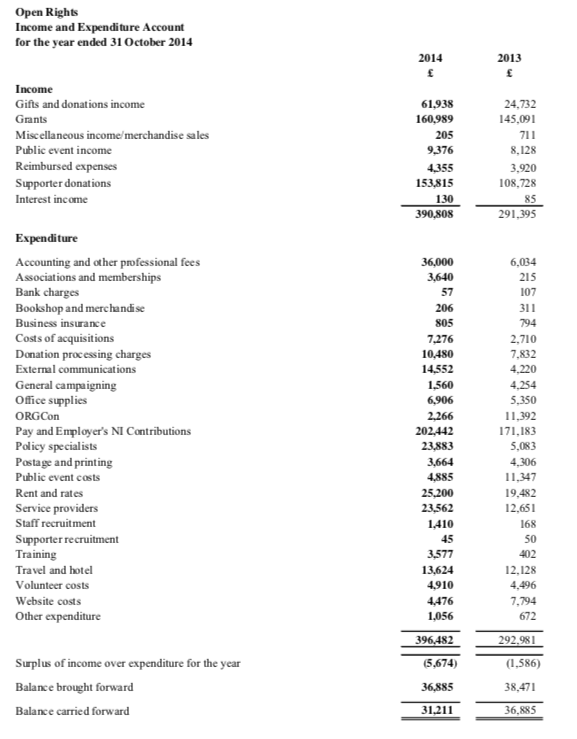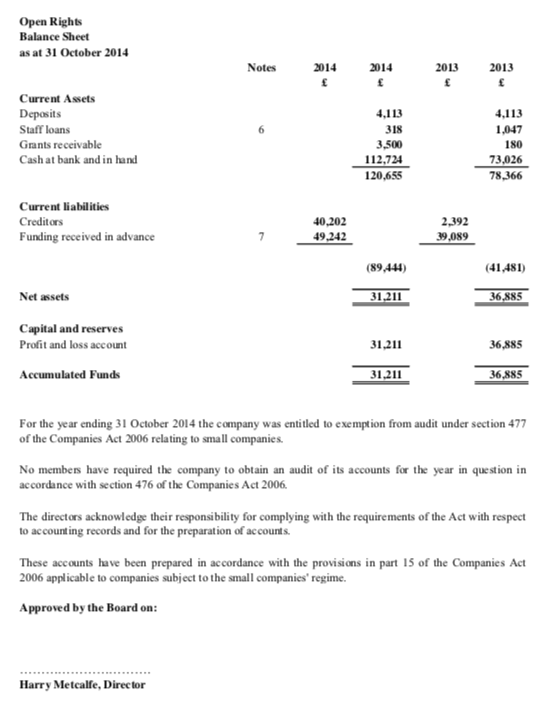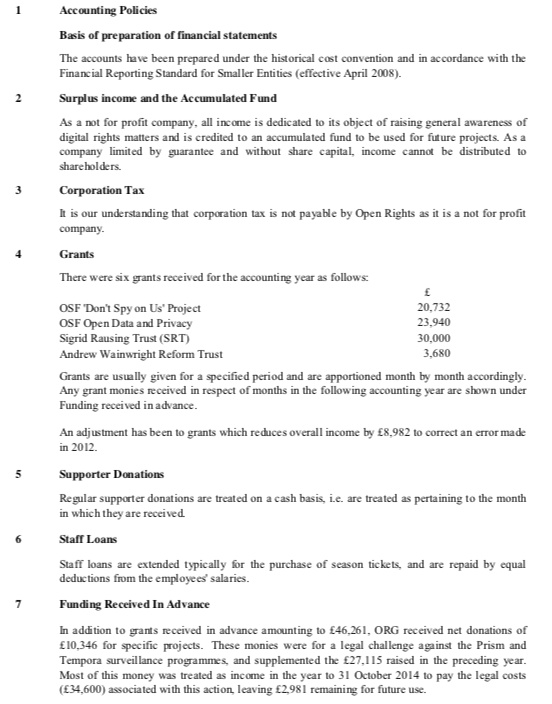Annual Report 2014
Contents
- Company Information
- Directors’ Report
- Accountants’ Report
- Income and Expenditure Account
- Balance Sheet
- Notes to Financial Statements
Company information
Directors
James Cronin
Simon Phipps
Alec Muffett
Maria Farrell
Harry Metcalfe
Ben Laurie
Milena Popova
Owen Blacker
John Elliott
Secretary
James Cronin
Accountants
Urban Ledgers Ltd 14 Thornhill Square London
N1 1BQ
Bankers
Cooperative Bank plc PO Box 101
1 Balloon Street Manchester
Principal activities
The principal activities of Open Rights (which trades as the Open Rights Group or ORG) are:-
● To raise awareness of digital rights matters in the media, with policy makers and with the general public.
● To preserve and extend civil, human and consumer rights in the digital environment.
● To nurture and assist a community of campaigning volunteers.
This is achieved by, among other things: the organisation of grassroots campaigns; lobbying politicians and policy makers; the provision of a media clearinghouse service; and the publication of research and white papers.
Financial results for the year
Overview
For the second year we have been dealing with revelations from Edward Snowden about GCHQ and NSA mass surveillance. This has created a huge opportunity to understand precisely what is taking place at the security agencies. It also helped us understand better the drive to deploy mass surveillance tools for the police, given that the UK Home Office had evidence that such tools could be made to work, and presumably believed in their efficacy.
As a small team, we have prioritised two key areas: mass surveillance; and online filtering in the UK. Other issues continued to be very important to us, particularly data protection, copyright reform, net neutrality and international treaties such as TTIP.
We completed a strategy review, which helped us understand our organisational and policy goals. This identified among other things a need to strengthen our communications and technical staff and accommodate the needs of Scotland, where the devolved administration has its own powers and is actively building a centralised and intrusive national identity system. We also recognised that we need to consider diversity issues to ensure.
We fundraised for a full time legal officer, and increased our membership income. We employed a technical officer, Communications Director and Local Groups Co-ordinator. We also fund raised for a Scotland Officer.
At the end of the year ORG had three full-time and four part-time staff based in London, and an increased number of volunteers organising activities in groups around the country.
Mass surveillance
Our campaigning and advocacy concentrated on building an alliance and co-ordinating efforts across civil society, as well as taking opportunities for action and informing MPs whenever possible. We helped create the Don’t Spy on Us coalition – informally at first – and secured funding for a secretariat and some activities. The coalition:● Designed Six UK Principles for surveillance reform
● Gathered 10,000 UK signatories supporting the principles
● Published a comprehensive policy paper
● Held a major Conference and Day of Action on 7 June
● Attended major Party conferences
ORG, Big Brother Watch, Constanze Kurz and English Pen continued with our complaint to the ECHR about UK mass surveillance. Fund raised donations for the legal challenge reached £35,000. We campaigned against the continuation of data retention laws in the UK, which was rushed through the UK Parliament after the Court of Justice of the European Union removed the existing EU data retention laws as a disproportionate interference into citizens’ privacy.
Data protection
Throughout this period we engaged with our EU partners in the process around the new regulation. We also responded to a public consultation by the Ministry of Justice on sanctions for data protection breaches, together with PI.
The new legislation has been on effective hold since 2014, when it passed from the Parliament to the EU Council of Ministers, which represents the individual governments. So far, as the member states have begun to discuss it in Council, they are attempting to water it down. If they have their way, European Data Protection could be worse under a new regulation.
Online filtering
In late 2013, the UK government persuaded ISPs that they should implement filters. ISPs promised to make sure they were set through user choice. We wanted to make sure that users knew that filters were crude and not to be relied on. We also needed to demonstrate the need for transparency about what is being blocked. We crowdfunded a video and campaign site, Department of Dirty, which explains the problems that filters create, including the privacy implications. Our website blocked.org.uk allows users to test URLs at each major provider. We have tested over 120,000 websites for blocking and have a good idea of the errors being made. We have a wealth of evidence and are looking for funding to fully analyse the information we have.
Mobile providers continued to default filter their connections, but reduced the scope of their filters in 2014, and introduced an appeals system using the BBFC. Our blocked.org.uk tests show they are now filtering around 4 per cent of top websites, mostly pornography. In contrast, ISP recommended settings are filtering up to 12 per cent of content.
Because of our work on blocked.org.uk we are attending meetings with the ISPs and affected groups to try to resolve some of the problems created by filters. Progress of this officially sanctioned process however is painfully slow.
Government’s use of data
We have carried out extensive work on government Open Data and possible privacy issues, with advocacy activities both at the UK and international levels. We co-authored guidance on privacy for the Open Government Guide and inputted on several projects and organisations, ranging from the Office of National Statistics census modernisation programme to the RECODE project for open access to research data.
In the period we also investigated the use of customers’ data by mobile telephone to build big data analytics services.
In 2013 we participated in the engagement process to help shape the Midata project to give consumers a right to obtain their consumption data from utilities and other service providers.
We were also part of the engagement in the ID assurance framework for accessing public services, including writing a full consultation response.
Copyright reform
We scored very significant success in 2014. ORG has campaigned for new copyright exceptions like parody and format shifting since 2005. In 2012, we gave evidence to the government’s consultation on a parody exception and ensured parodists contributed via RighttoParody.org.uk including the b3ta.com community, mashup artists including the duo Cassette Boy and Swedemason and comedian Graham Linehan.
In early 2014, we lobbied and ran email actions to ensure the exceptions were not dropped when they were delayed by rights holder lobbying prompting internal disagreements within government.
When the exceptions passed into law in summer 2014, the Minister, Baroness Neville-Rolfe, quoted examples of film maker Ben Wheatley starting his career with parody mashups at b3ta.com – whout naming the website. One half of Cassette Boy (Boy) was interviewed on BBC TV. Boy, disguised as a cassette, explained that parody takedowns “feel like censorship”.
Financial situation
Open Rights Group has grown fourfold in the last five years. In the year to 31 October 2014 alone the Group’s total income grew by over a third compared with the previous year. However, expenditure grew by a similar amount, resulting in a small loss for the year of £5,674 (1.4 per cent).
ORG received grants income from four trusts during the year, and this support, together with support from ordinary citizens concerned about digital rights, is essential to our work and much appreciated by the ORG activist community as well as the ORG team. The Open Society Foundations (OSF) continued funding us, in respect of two projects: one entitled ‘Don’t Spy On Us’ relating to mass surveillance and the other being a one-year grant on Open Data and Privacy which commenced just before the start of this financial year; plus a grant of £36,669 towards specified core costs. OSF has provided ORG with it’s longest continual grant funding stream, and was our single largest grant funder in the year. The Joseph Rowntree Reform Trust continued funding us to the tune of £54,950, including a grant of £72,800 over 15 months to 31 July 2015 towards our central campaign against mass surveillance (most of which will be accounted for in the report for the year to 31 October 2015). We received £30,000 from the Sigrid Rausing Trust towards core activities. Finally the Andrew Wainright Reform Trust gave us £3,680 for grassroots campaigning on surveillance. A grant of just over £24,000 received from the Renewable Freedom Foundation towards digital security training is not shown as income: since this is for a project to commence in 2015, this is shown within the total Funding received in advance.
Overall gifts and donations including regular donations from supporters grew by 10 per cent compared with the previous year. Regular Supporter donations showed a growth of 40 per cent, as ordinary people continued to react against the threats to their privacy being debated in the wake of Edward Snowden. In addition to the total raised, over £27,000 raised in 2012 – 13 which was held as Funding received in advance at the start of the year was treated as Gifts and donations income in the year, in order to finance the costs of a legal challenge against the government surveillance programme known as ‘Prism’. It should be noted that the legal bill for the challenge (£34,600) arrived at the very end of the year so is shown under Accounting and other professional fees, but also makes up the bulk of the amount for Creditors on the Balance Sheet.
ORG’s annual conference ‘ORGCon’ in 2013 took place in June 2013, but since ORGCon 2014 took place on November 15 2014, after the accounting year end, only part of the costs (and income) relating to this event fell in the 2013-14 accounting year, the remaining income and expenditure to be reported next year.
Since Open Rights Group made a small loss in the year, reserves fell to £31,211. It is the intention of the Group to build up reserves in the next accounting year.
Directors’ remuneration
Directors of Open Rights are volunteers and none received remuneration for their services during this year.
Company status
The company is limited by guarantee and all members have agreed to contribute a sum not exceeding £1 in the event of a winding up. Number of guarantors at 31 October 2014 – three.
By order of the Board
Harry Metcalfe, Director
Accountants’ Report to the Directors of Open Rights
You consider that the company is exempt from audit for the year ended 31 October 2014. You have acknowledged, on the balance sheet, your responsibilities for complying with the requirements of the Companies Act 2006 with respect to accounting records and the preparation of the accounts. These responsibilities include preparing accounts that give a true and fair view of the state of affairs of the company at the end of the financial year and its profit or loss for the financial year.
In accordance with your instructions, we have prepared the accounts which comprise the Profit and Loss Account, the Balance Sheet and the related notes from the accounting records of the company and on the basis of information and explanations you have given to us.
The accounting records and explanations provided appear to be reasonable, however we have not carried out an audit or any other review, and consequently we do not express any opinion on these accounts.
Urban Ledgers Ltd 14
Thornhill Square
London



